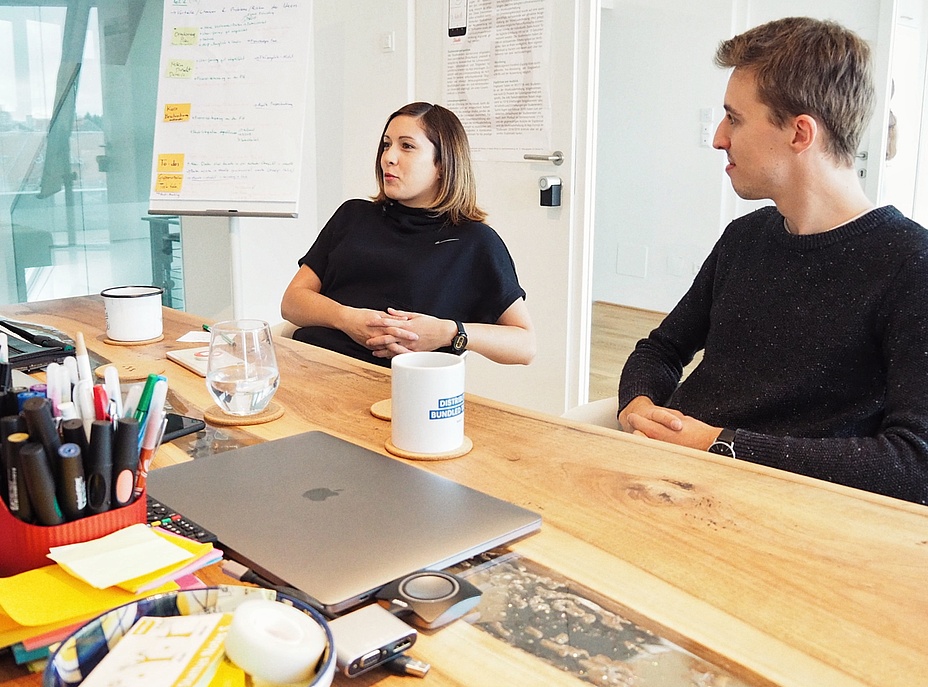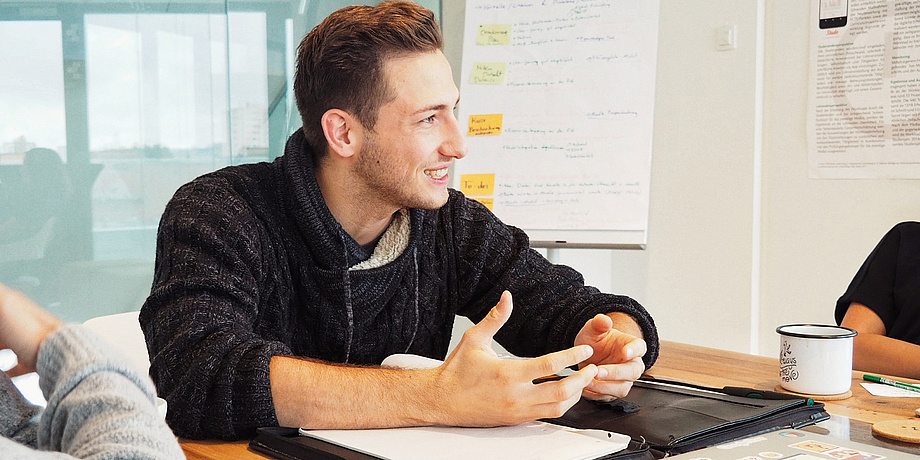Runtastic for the gym
Valentin Slawicek, the initiator of Studo and current Chief Technical Officer (CTO), was already programming in 2014 – but on a fitness app. “Back then, Runtastic was really big and since my colleague Christian was an avid fitness athlete, it was only logical to develop an app for the gym,” says Slawicek, recalling the beginnings of his programming days. He worked on this app together with the later co-founder of Studo, Christian Lanz, who also studied at the Graz University of Technology (TU Graz). It was functional, fulfilled many use cases, but there was one thing it was not: it was not visually appealing. They needed a design for it – which is why the two of them searched for a designer via a Facebook ad. Instead of a male designer, a female designer came forward. She was also a big fitness fan and got along with them right away. The new member of the team was Stefanie Horvath and as a trio they worked even harder on the app.
The intelligent news app
At about the same time the two students Julian Kainz and Manuel Schmölzer met. Their vision was to develop a news portal in app format. When they came up against their limits during development, they needed the help of a programmer. A young developer answered the ad at TU Graz, and he was to support them from now on. His name was Valentin Slawicek. The fact that Slawicek was working on a fitness app did not remain hidden from Kainz and Schmölzer for long – both enthusiastic athletes. Thus the initially one-sided cooperation turned into a two-way one. These two projects had little in common with today's Studo app, but that was about to change.
Making a virtue out of a necessity
Thick concrete walls which do not allow internet connections and a warning from a lecturer – these were the triggers for an idea by Valentin Slawicek – student of the information and computer engineering bachelor's programme. “In the third semester at Graz University of Technology I got lost on my way to the lecture hall and arrived late for the lecture. The lecturer told me off in front of everyone, which of course annoyed me very much,” explains Slawicek, "especially since the information on the room plan could have been easily accessed via mobile phone but due to the thick walls the mobile network did not work. It's hard to believe that in 2014 such simple information was not accessible by mobile phone.” He wanted to find a solution for this problem, so he cycled home in a huff, sat down at his PC and programmed his first university app that very afternoon.
The app, which offered an overview of the courses and a room plan of TU Graz, did not remain a secret for long, of course. Demand for the app from Slawicek's fellow students came fast, and due to the great interest, he finally published it. From Slawicek's student residence the app spread by word of mouth and after a Christmas meeting in his home town Salzburg with friends who studied in Linz, Salzburg and Vienna, they too wanted the app. Within two months, Slawicek developed eight separate university apps that were used by over 5000 students.
Studo emerged from many university apps
Studo was the project where the potential was greatest and the use case most obvious. (Julian Kainz)
After the successful release of the apps, the “uni app” project was finished for Slawicek. After that he just wanted to dedicate himself again to the fitness and news app together with his team. Moshbit GmbH was founded in 2015 to pursue these two projects. “But we decided to focus on one project, and that was Studo,” says Julian Kainz, “this was where the potential was greatest and the use case most obvious,” and instead of the many separate university apps, the team developed a joint app that was soon named Studo. In the meantime, students can use Studo at any university in Germany and Austria and organize their daily study routine. In retrospect, the founders would have backed Studo more quickly.
These are the lessons we learned for prospective start-ups

“Corporate culture is the be-all and end-all of a company. If the team pulls together and sticks together, anything is possible.”
- Use the start-up programmes at TU Graz!
Julian Kainz: “We did the start-up garage together as a team. This gave us an incredible amount of knowledge and contacts. For example, we met Stefan Vorbach there, the current Vice Rector for Academic Affairs, who later supported us with Studo.”
The Gründungsgarage is an Academic Startup Accelerator of Graz University of Technology and the University of Graz, where selected teams develop their business idea for one semester.
- Concentrate on one product!
Valentin Slawicek: “Studo was already working well and had many users. This was not the case with the other projects but we pursued them anyway. When we finally decided to go with Studo, we found peace of mind and developed it much faster.” - Do not underestimate iOS!
Valentin Slawicek: “Another lesson learned is that iOS is not to be ignored. With the first proceeds from the university apps I was able to buy a MacBook – which is still in use today – and program Studo for Apple users as well.” - Feedback is valuable!
Valentin Slawicek: “To this day we have never lost sight of the users. Our team consists of students and we are in constant dialog about what is needed. That's what makes us successful.” - Culture eats strategy for breakfast!
Julian Kainz: “Corporate culture is the be-all and end-all of a company. If the team pulls together and sticks together, anything is possible.” - Turn your start-up into a brand!
Stefanie Horvath: “For Studo, we were looking for a name that would stick in the memory and a branding that would go beyond conventional ideas of students. To all designers: stand up for your ideas, I had to assert myself a lot when branding Studo!”
University cooperation by word of mouth
Of the five founders, three are still active at Studo today: Julian Kainz as managing director, Valentin Slawicek as CTO and Stefanie Horvath as head of brands. But not only they are working on the app. Since the formation of Studo 2016, the team has grown to twelve employees. They look after app development, marketing and sales. Sales runs through two channels: either students whose universities are not Studo partners buy the Studo app as a PRO version and can thus use all the functions, or universities offer the full version free of charge in a cooperation with Studo. This opportunity has already been taken by 16 universities in Austria that have become partners of Studo. Since November 2018, Graz University of Technology has also been offering Studo as an official university app.

Many universities are cooperation partners of Studo and offer the full version of the app free of charge.
From model start-up to digitalisation partner
Since its foundation, Studo has grown to become a partner in the field of digitalisation for universities. The app start-up has been transformed into a reliable educational technology (EdTech) company. Today, Studo sees itself as a partner that supports universities on the path of digitalisation and maps processes in teaching, studies and research more efficiently. For this purpose, Studo offers, in addition to the app, other tools for universities in Austria and Germany. These tools include, for example, the workload survey, with which students can track the actual workload of courses, the mobile course evaluation or the Studo app for staff. And it gets even bigger, says managing director Julian Kainz: “The next step is obvious: we want to go international.”
What does Studo mean for the founders?
- Valentin Slawicek: “For me, Studo is the tool that helps my friends and their colleagues get through their everyday studies more easily.”
- Stefanie Horvath: “Studo is a love brand and when I see people using Studo and they get a glint in their eye, my heart sings.”
- Julian Kainz: “Studo helps universities go digital. We have the tools to help universities meet the challenges of digitalisation more easily.”
